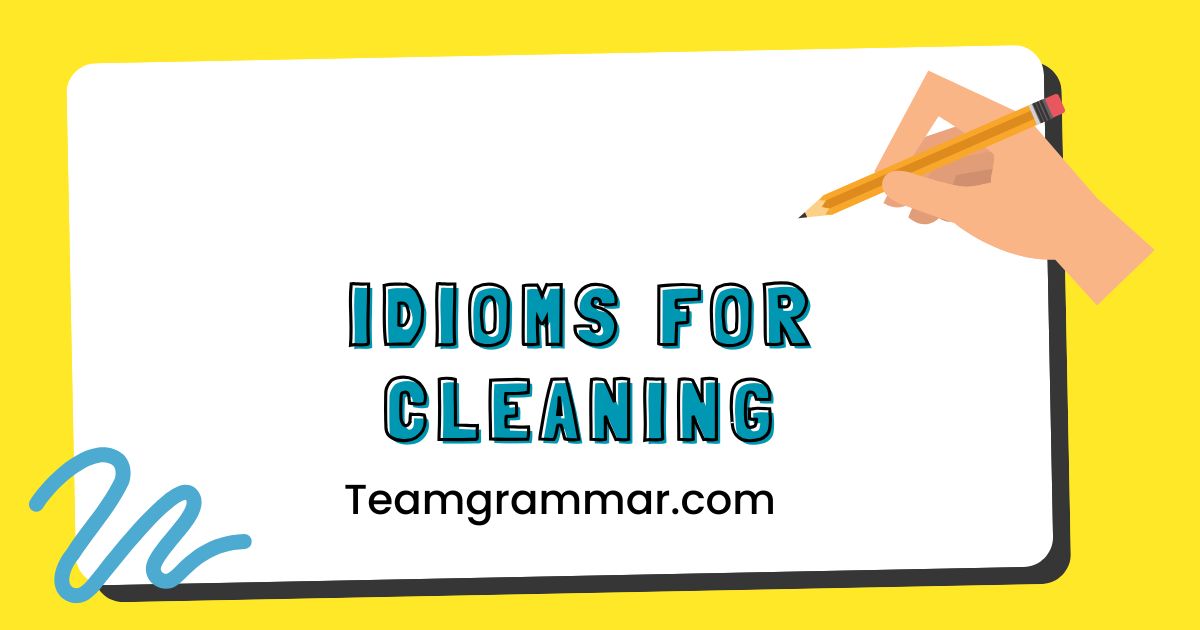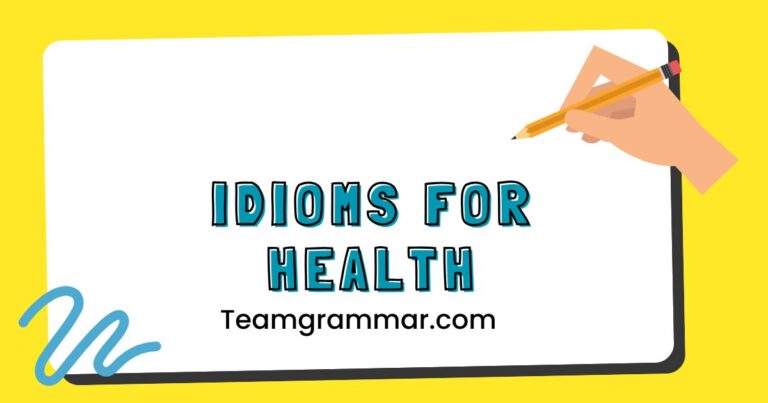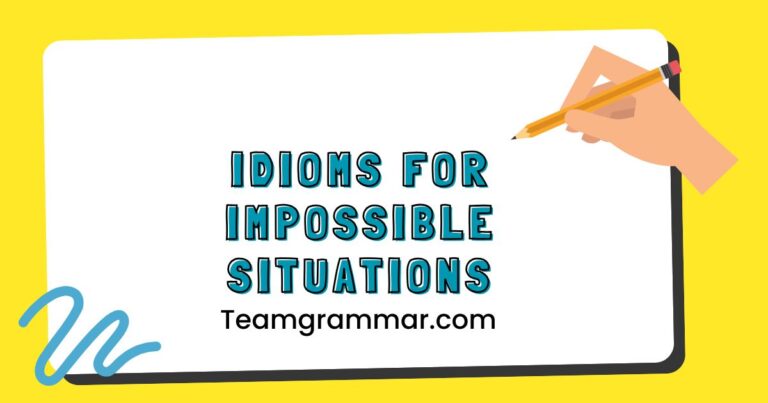30 Idioms for Cleaning: Mastering Figurative Language
Understanding idioms is crucial for mastering English because they add color and depth to communication. Idioms related to cleaning are particularly common and reflect everyday activities with figurative meanings.
This article explores various idioms related to cleaning, providing definitions, examples, and practice exercises. It is designed for English language learners of all levels who want to improve their comprehension and fluency by mastering these idiomatic expressions.
Table of Contents
- Introduction
- Definition of Idioms for Cleaning
- Structural Breakdown
- Types and Categories of Cleaning Idioms
- Examples of Cleaning Idioms
- Usage Rules
- Common Mistakes
- Practice Exercises
- Advanced Topics
- FAQ
- Conclusion
Introduction
Idioms are phrases or expressions whose meanings cannot be understood from the ordinary meanings of the words. They enrich the English language, making it more expressive and nuanced.
Cleaning idioms, in particular, often use metaphors and similes drawn from the act of cleaning to describe various situations and behaviors. Mastering these idioms allows for a deeper understanding of English conversation and literature.
This guide will provide a comprehensive exploration of cleaning idioms, their meanings, and how to use them correctly.
Definition of Idioms for Cleaning
Idioms for cleaningare expressions that use cleaning-related actions or objects in a figurative sense to convey a different meaning. These idioms often describe situations where something is being corrected, resolved, or improved, either literally or metaphorically.
They add color and depth to everyday language, making communication more engaging and expressive. The function of these idioms is to provide a more vivid and relatable way to describe abstract concepts or situations.
These idioms can be classified based on their specific figurative meanings. Some relate to resolving conflicts, while others describe the process of removing unwanted elements or improving a situation.
Understanding the context in which these idioms are used is crucial for interpreting their intended meaning. They are commonly used in both formal and informal settings, adding a layer of expressiveness to conversations and writing.
Structural Breakdown
The structure of cleaning idioms often involves a verb related to cleaning (e.g.,sweep,wash,clean) combined with a noun or prepositional phrase to create a figurative meaning. For example, “sweep something under the rug” follows the structure of [verb + object + prepositional phrase].
Understanding the structural components of these idioms helps in recognizing and interpreting their meanings.
Many cleaning idioms are fixed expressions, meaning their words cannot be changed without altering the meaning. However, some idioms allow for slight variations in tense or verb form.
The grammatical structure of these idioms follows standard English rules, but their overall meaning is not derived from the literal meanings of the individual words. Instead, the meaning is inferred from the idiomatic context.
Types and Categories of Cleaning Idioms
Idioms Related to Covering Up
These idioms involve hiding or concealing something, often a mistake or wrongdoing, similar to hiding dirt while cleaning.
Idioms Related to Purification
These idioms suggest a process of cleansing or removing impurities, both literally and metaphorically.
Idioms Related to Order and Organization
These idioms describe the act of bringing order to chaos or organizing something efficiently.
Idioms Related to Starting Fresh
These idioms imply beginning anew, often after clearing away past issues or problems.
Examples of Cleaning Idioms
Idioms Related to Covering Up
These idioms often describe situations where problems or mistakes are hidden rather than resolved. They can imply dishonesty or a lack of accountability.
Below is a table listing several idioms related to covering up, along with their meanings and example sentences.
| Idiom | Meaning | Example Sentence |
|---|---|---|
| Sweep something under the rug | To hide a problem or mistake in an attempt to keep it secret. | The company tried to sweep the accounting errors under the rug, but the auditors discovered them anyway. |
| Paper over the cracks | To hide problems or disagreements in a way that is temporary and not likely to last. | They tried to paper over the cracks in their relationship, but the underlying issues remained. |
| Brush something aside | To ignore or dismiss something as unimportant. | She brushed aside his concerns about the project, saying they were not relevant. |
| Conceal the truth | To hide the truth from someone. | He tried to conceal the truth about his involvement in the scandal. |
| Keep it under wraps | To keep something secret. | They wanted to keep the project under wraps until its official launch. |
| Hide one’s head in the sand | To ignore a problem and hope it will go away. | You can’t just hide your head in the sand and pretend the problem doesn’t exist. |
| Bury the hatchet | To make peace after a disagreement. | After years of feuding, the two families finally decided to bury the hatchet. |
| Cover up | To hide a mistake or crime. | The government was accused of trying to cover up the scandal. |
| Mask the problem | To hide the real issue. | The new policy only masked the problem without addressing the root cause. |
| Keep mum | To remain silent about something. | He was told to keep mum about the details of the investigation. |
| Muffle the sound | To suppress or reduce the noise. | They tried to muffle the sound of their argument so the neighbors wouldn’t hear. |
| Obscure the facts | To make the facts unclear or difficult to understand. | The lawyer tried to obscure the facts to protect his client. |
| Hide the evidence | To conceal or destroy evidence. | The criminal attempted to hide the evidence to avoid being caught. |
| Keep quiet about it | To not talk about something. | We decided to keep quiet about it to avoid causing unnecessary alarm. |
| Downplay the significance | To make something seem less important than it is. | The company tried to downplay the significance of the data breach. |
| White wash | To conceal faults or wrongdoings. | The report was accused of being a white wash, designed to protect the company’s reputation. |
| Draw a veil over | To deliberately avoid mentioning something. | Let’s draw a veil over that unfortunate incident and move on. |
| Disguise the truth | To conceal a fact by misrepresentation. | He tried to disguise the truth by telling a series of lies. |
| Smokescreen | Something concealing the truth. | The politician’s speech was just a smokescreen to distract from the real issues. |
| Camouflage | To hide something by making it look like its surroundings. | He tried to camouflage his mistakes with complicated explanations. |
| Secretive | Inclined to conceal information. | The company was very secretive about their new product. |
| Cover one’s tracks | To conceal one’s activities. | The spy tried to cover his tracks to avoid being detected. |
| Paper over | To hide something. | The government tried to paper over the scandals with public relations campaigns. |
Idioms Related to Purification
These idioms describe actions that remove impurities or improve a situation, often suggesting a fresh start or a restoration of something to its original state.
The table below provides various purification-related idioms, with examples to illustrate their usage.
| Idiom | Meaning | Example Sentence |
|---|---|---|
| Clean the slate | To make a fresh start by forgetting past mistakes or problems. | After the merger, we decided to clean the slate and start with new strategies. |
| Wash away | To remove or eliminate something, especially negative feelings or problems. | The rain seemed to wash away all the worries of the day. |
| Purge | To remove or eliminate something completely, often something undesirable. | The company decided to purge all outdated data from its systems. |
| Clear the air | To resolve a misunderstanding or tension. | They needed to clear the air after the argument to move forward. |
| Get something off your chest | To express something that has been bothering you. | He needed to get his frustrations off his chest before he could focus on the task. |
| Wipe the floor with someone | To defeat someone easily in a competition or argument. | Our team wiped the floor with the competition in the final round. |
| Rinse and repeat | To do something repeatedly in the same way. | The process involves a rinse and repeat cycle until the product is clean. |
| Clean as a whistle | Completely clean or innocent. | The investigation found that he was clean as a whistle and had no involvement in the crime. |
| Scrub clean | To clean something thoroughly. | She scrubbed the kitchen clean after the party. |
| Sanitize | To make something hygienic. | The hospital staff sanitize the equipment after each use. |
| Disinfect | To clean with a disinfectant. | They disinfect the surfaces to prevent the spread of germs. |
| Sterilize | To make something free from bacteria. | The medical tools are sterilized before surgery. |
| Flush out | To remove something by flushing with water. | He drank plenty of water to flush out the toxins from his body. |
| Wash one’s hands of | To disclaim responsibility for. | The manager washed his hands of the project when it started to fail. |
| Exonerate | To clear someone of blame. | The evidence exonerated him from all charges. |
| Absolve | To free someone from guilt. | The court absolved him of any responsibility in the accident. |
| Redeem | To compensate for the faults or bad aspects of (something). | He hoped to redeem himself after his past mistakes. |
| Rectify | To correct something that is wrong. | The company took steps to rectify the errors in the report. |
| Amends | To make reparations for a wrong or injury. | He tried to make amends for his mistakes by apologizing sincerely. |
| Atone | To make amends or reparation. | He wanted to atone for his past actions by volunteering his time. |
| Rehabilitate | To restore someone to health or normal life. | The program aimed to rehabilitate offenders and reduce crime. |
| Revitalize | To give new life or vitality to. | The new management team helped to revitalize the struggling company. |
| Renew | To resume an activity after an interruption. | They decided to renew their efforts to find a solution. |
Idioms Related to Order and Organization
These idioms describe actions that involve arranging things neatly or efficiently, often suggesting a sense of control and clarity.
The following table illustrates idioms related to order and organization, providing meanings and sample sentences.
| Idiom | Meaning | Example Sentence |
|---|---|---|
| Get your house in order | To organize your affairs or solve your problems. | The company needs to get its house in order before seeking new investments. |
| Tidy up | To make a place neat and organized. | Please tidy up your room before dinner. |
| Straighten up | To become more organized or well-behaved. | He needed to straighten up his act if he wanted to keep his job. |
| Sort out | To resolve a problem or organize things. | We need to sort out the logistics before the event. |
| Arrange | To put things in a particular order or position. | She carefully arranged the flowers in the vase. |
| Put in order | To organize or arrange something. | The files were put in order alphabetically. |
| Streamline | To make something more efficient. | The company streamlined its processes to reduce costs. |
| Systematize | To organize according to a system. | They systematized the workflow to improve productivity. |
| Clean sweep | A thorough removal of unwanted things or people. | The new manager made a clean sweep of the department, replacing several employees. |
| From top to bottom | Thoroughly or completely. | The house was cleaned from top to bottom before the guests arrived. |
| Neaten up | To make something neater. | He neatened up his desk before leaving for the day. |
| Organize | To arrange things systematically. | She organized her closet by color and type of clothing. |
| Rationalize | To make something more efficient and logical. | The company rationalized its operations to improve profitability. |
| Consolidate | To combine into a single more effective or coherent whole. | The company decided to consolidate its departments to reduce duplication. |
| Orderly | Neat and well organized. | The office was very orderly and efficient. |
| Tidy | Neat and organized. | She kept her room very tidy. |
| Shipshape | In good order; well-organized. | The house was in shipshape for the open house. |
| Spick and span | Neat and clean. | The kitchen was spick and span after she finished cleaning. |
| Well-kept | Maintained in good condition. | The garden was well-kept and beautiful. |
| In apple-pie order | In perfect order. | Everything in the house was in apple-pie order. |
Idioms Related to Starting Fresh
These idioms describe actions that involve beginning anew, often after resolving past issues or making significant changes.
The following table provides idioms related to starting fresh, along with their meanings and example sentences.
| Idiom | Meaning | Example Sentence |
|---|---|---|
| Turn over a new leaf | To change your behavior and become a better person. | He decided to turn over a new leaf and quit his bad habits. |
| Start from scratch | To begin something again from the beginning. | The business failed, so they had to start from scratch. |
| Wipe the slate clean | To disregard past mistakes and start over. | The new manager decided to wipe the slate clean and implement new policies. |
| Fresh start | A new beginning. | Moving to a new city gave her a fresh start in life. |
| New beginning | A new phase or opportunity. | The new year represents a new beginning for many people. |
| Reinvent oneself | To change one’s personality or lifestyle completely. | After retiring, he decided to reinvent himself as a painter. |
| Reboot | To restart something, often a computer system. | The computer was frozen, so I had to reboot it. |
| Begin anew | To start something again. | After the setback, they decided to begin anew with a different approach. |
| Clear the decks | To remove obstacles and prepare for a new task. | We need to clear the decks before starting the new project. |
| Break the mold | To do things differently from the norm. | The company decided to break the mold with its innovative marketing strategy. |
| Start over | To begin again. | If you make a mistake, you can always start over. |
| New dawn | A new beginning or era. | The end of the war marked a new dawn for the country. |
| Blank canvas | A fresh, unmarked beginning. | The empty room was like a blank canvas, ready to be decorated. |
| Reset | To set something to zero or its original state. | We need to reset the system to fix the problem. |
| Back to square one | To start over from the beginning. | The negotiations failed, so we’re back to square one. |
| Turn a page | To move on from a past event. | It’s time to turn a page and focus on the future. |
| Recommence | To begin again. | They decided to recommence the project after a brief pause. |
| Reshuffle | To reorganize or rearrange. | The manager decided to reshuffle the team to improve efficiency. |
| Start afresh | To begin again with a clean slate. | She decided to start afresh in a new city. |
| Open a new chapter | To begin a new phase in life. | He felt like he was opening a new chapter after his divorce. |
Usage Rules
When using cleaning idioms, it’s important to consider the context and audience. While these idioms are common, they may not be appropriate in all situations, especially in formal writing or when speaking to someone unfamiliar with idiomatic expressions.
Ensure that the idiom’s meaning aligns with the intended message and that it is used in a grammatically correct manner within the sentence.
Pay attention to the nuances of each idiom. Some idioms may have subtle differences in meaning or connotation, which can affect how they are perceived.
For instance, “sweep something under the rug” has a negative connotation, implying dishonesty, while “clean the slate” suggests a more positive and proactive approach to starting over. Correct usage involves understanding these nuances and selecting the most appropriate idiom for the situation.
Common Mistakes
One common mistake is using the literal meaning of the words in the idiom instead of the figurative meaning. For example, misunderstanding “sweep something under the rug” as actually cleaning instead of hiding a problem.
Another frequent error is altering the words of a fixed idiom, which can change its meaning or make it nonsensical. For example, saying “brush the dirt under the rug” instead of “sweep something under the rug.”
Another mistake is using idioms inappropriately in formal contexts. While idioms add color to everyday language, they may not be suitable for academic writing or professional presentations.
It’s important to be aware of the audience and adjust language accordingly. Also, be cautious about using idioms from one language in another, as they may not translate directly or have the same connotations.
Here are some examples of common mistakes with cleaning idioms:
| Incorrect | Correct | Explanation |
|---|---|---|
| She washed the problem under the rug. | She swept the problem under the rug. | “Sweep” is the correct verb in this idiom. |
| They cleaned the air out. | They cleared the air. | The correct idiom is “clear the air,” not “clean the air out.” |
| He got the cat off his chest. | He got something off his chest. | The idiom is “get something off your chest,” not “get the cat off his chest.” |
| She wiped the floor by him. | She wiped the floor with him. | The correct preposition is “with,” not “by.” |
| I am turning a new leaf over. | I am turning over a new leaf. | The correct order is “turning over a new leaf.” |
| He is starting from zero. | He is starting from scratch. | The correct idiom is “starting from scratch.” |
Practice Exercises
Exercise 1: Fill in the Blanks
Fill in the blanks with the correct cleaning idiom from the list below.
Idiom List: sweep it under the rug, clean the slate, get his house in order, clean as a whistle, clear the air, turn over a new leaf, wipe the floor with, start from scratch, wash his hands of, tidy up
| Question | Answer |
|---|---|
| 1. The company tried to _______ when the scandal broke. | sweep it under the rug |
| 2. After the argument, they needed to _______. | clear the air |
| 3. He decided to _______ and quit smoking. | turn over a new leaf |
| 4. The detective found that the suspect was _______. | clean as a whistle |
| 5. The new manager decided to _______ and implement new strategies. | clean the slate |
| 6. She told her son to _______ his room before his friends came over. | tidy up |
| 7. He claimed he wanted to _______ the whole affair. | wash his hands of |
| 8. The business failed, and they had to _______. | start from scratch |
| 9. The team _______ their opponents in the championship game. | wipe the floor with |
| 10. The CEO needed to _______ before seeking investors. | get his house in order |
Exercise 2: Match the Idiom to Its Meaning
Match the cleaning idiom to its correct meaning.
| Idiom | Meaning | Answer |
|---|---|---|
| 1. Paper over the cracks | A. To make a fresh start | 1. B |
| 2. Clean the slate | B. To hide problems temporarily | 2. A |
| 3. Get something off your chest | C. To organize your affairs | 3. E |
| 4. Get your house in order | D. To start over from the beginning | 4. C |
| 5. Start from scratch | E. To express your feelings | 5. D |
Exercise 3: Use the Idiom in a Sentence
Use the following cleaning idioms in a sentence that demonstrates their meaning.
| Idiom | Example Sentence |
|---|---|
| 1. Brush something aside | He brushed aside her concerns and continued with the project. |
| 2. Clear the air | They decided to clear the air after the misunderstanding. |
| 3. Turn over a new leaf | After his mistake, he promised to turn over a new leaf. |
| 4. Sweep it under the rug | The politician tried to sweep the scandal under the rug. |
| 5. Wash one’s hands of | The manager decided to wash his hands of the failing project. |
Advanced Topics
Advanced learners can explore the historical origins of cleaning idioms and how their meanings have evolved over time. Researching the cultural contexts in which these idioms originated can provide deeper insights into their nuances and usage.
For example, some idioms may have roots in specific historical events or social customs related to cleaning practices.
Another advanced topic is the use of cleaning idioms in literature and media. Analyzing how authors and filmmakers use these idioms to convey meaning and create imagery can enhance comprehension and appreciation of English language arts.
Also, exploring regional variations in cleaning idioms can reveal differences in language use across different English-speaking countries and communities.
FAQ
- What is an idiom?
An idiom is a phrase or expression whose meaning cannot be understood from the ordinary meanings of the words it contains. Idioms use figurative language to convey a specific idea or concept.
- Why is it important to learn idioms?
Learning idioms is crucial for understanding native English speakers and for making your own speech and writing more expressive and natural. Idioms add color and depth to communication.
- How can I learn new idioms effectively?
One of the best ways to learn idioms is through context. Pay attention to how idioms are used in conversations, books, and movies. Keep a notebook to record new idioms and their meanings. Practice using them in your own speech and writing.
- Are cleaning idioms common in English?
Yes, cleaning idioms are quite common in English. They draw on everyday activities to describe various situations and behaviors, making them relatable and easy to understand.
- Can I use cleaning idioms in formal writing?
While some cleaning idioms are appropriate for formal writing, others are more suited for informal contexts. Consider your audience and the tone of your writing when deciding whether to use an idiom.
- What is the difference between an idiom and a metaphor?
A metaphor is a figure of speech that directly compares two unrelated things, while an idiom is a fixed expression with a figurative meaning that is different from the literal meanings of its individual words. Idioms are often based on metaphors, but not all metaphors are idioms.
- How do I avoid misusing idioms?
To avoid misusing idioms, make sure you understand their correct meaning and context. Pay attention to how native speakers use them, and practice using them yourself. If you’re unsure, it’s better to avoid using an idiom than to use it incorrectly.
- Where can I find resources to learn more about idioms?
There are many resources available for learning idioms, including online dictionaries, language learning websites, and books on English idioms. Additionally, watching English-language movies and TV shows and reading English books can help you learn idioms in context.
- Is it okay to translate idioms literally?
No, it is generally not okay to translate idioms literally, as the literal translation will likely not make sense in the target language. Idioms are culturally specific, and their meanings are not derived from the individual words they contain. Instead, they should be translated with an equivalent idiom or expression in the target language that conveys the same meaning.
- How do idioms contribute to cultural understanding?
Idioms often reflect the culture and history of a language, providing insights into its values, beliefs, and customs. Learning idioms can enhance your understanding of a culture and improve your ability to communicate effectively with people from that culture.
Conclusion
Mastering idioms, especially those related to cleaning, significantly enhances English language proficiency. These expressions add depth and nuance to communication, making it more engaging and expressive.
By understanding the meanings, usage rules, and common mistakes associated with cleaning idioms, learners can improve their comprehension and fluency.
To further enhance your understanding, practice using these idioms in everyday conversations and writing. Pay attention to how native speakers use them and continue to expand your vocabulary of idiomatic expressions.
Remember, consistent practice and exposure are key to mastering idioms and becoming a more confident and effective communicator in English.







